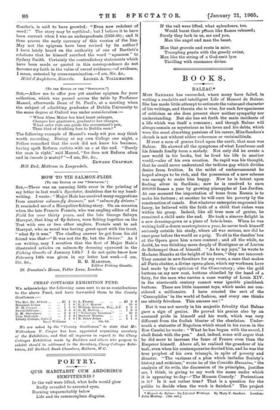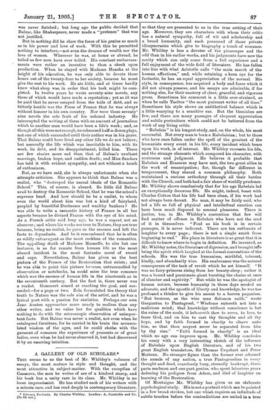MISS SANDARS has succeeded, where many have failed, in writing
a readable and intelligent Life of Honore de Balza°. She has made little attempt to estimate the value and character of his writings, and therein she is wise, for such few specimens of criticism as she does present show neither sympathy nor understanding. But she has set forth the main incidents of a life which was itself a romance; and though Balzac will always remain as mysterious as his loves and his debts, which were the most absorbing passions of his career, Miss Sandars's sketch is not without either coherence or verisimilitude.
If ever a man of genius lived upon the earth, that man was Balzac. He showed all the symptoms of what Lombroso and his friends fondly term a malady. Not only did he create a new world in his books, but he lived his life in another world,—also of his own creation. So rapid was his thought, that he could never understand the tedious gap which divides desire from fruition. In the midst of embarrassment he hoped always to be rich, and the possession of a new scheme was enough to make him happy. Now he is intent upon finding silver in Sardinia; now he is resolved to earn 400,000 francs a. year by growing pineapples at Lea Jardies. At one moment the importation of trees from Russia is to
make his fertune ; at another he will cure his poverty by the construction of canals. But whatever enterprise engrossed his fancy, he believed with the faith of a child that riches were within his grasp. Indeed, like all true men of genius, he remained a child unto the end. He took a sincere delight in a new dressing,gown or a piece of bric-h-brac. When be was writing half-a-dozen masterpieces a year, he never took himself seriously outside his study, where all was serious, nor did he once pose before the world as a prig. To sit in the dandies' box at the Opera gave him a rare content ; and all the while, no doubt, he was thinking more deeply of Raatignac or of Lucien de Rubempre than of himself. " As to my joys," he wrote to Madame Hanska at the height of his fame, " they are innocent. They consist in new furniture for my room, a cane that makes all Paris chatter, a divine opera-glass, which my workmen have had made by the optician of the Observatory; also the gold buttons on my new coat, buttons chiselled by the hand of a fairy, for the man who carries a cane worthy of Louis XIV. in the nineteenth century cannot wear ignoble pinchbeck buttons. These are little innocent toys, which make me con- sidered a millionaire. I have created the sect of the Cannophiles' in the world of fashion, and every one thinks me utterly frivolous. This amuses me ! "
But it was not merely in his majestic frivolity that Balza° gave a sign of genius. He proved his genius also by an assumed pride in himself and his work, which was very different from the foolish bluster of the charlatan. Under- neath a statuette of Napoleon which stood in his room in the Rue Cassini he wrote : " What he has begun with the sword, I shall finish with the pen." And, indeed, some will argue that he did more to increase the fame of France even than the Emperor himself. Above all, he realised the grandeur of his task, even when his contemporaries decried him, and he was the true prophet of his own triumph, in spite of poverty and disaster. " The vastness of a plan which includes Society's history and criticism," wrote he of the Comedie Humains," the analysis of its evils, the discussion of its principles, justifies me, I think, in giving to my work the name under which it is appearing to-day—' The Human Comedy.' Pretentious is it ? Is it not rather true P That is a question for the public to decide when the work is finished." The project • Hononf de Balzac his Lift and Writings. By Mary F. Sandars. London: John Murray. [12e. net.]
was never finished ; but long ago the public decided that Balzac, like Shakespeare, never made a "pretence" that was not justified.
But in nothing did he show the force of his genius so much as in his power and love of work. With this he permitted nothing to interfere,—not even the dreams of wealth nor the love of women. Wherever he was, at home or abroad, he toiled as few men have ever toiled. His constant embarrass- ments were rather an incentive to than a check upon production. When he stayed with Madame Hanska at the height of his adoration, he was only able to devote three hours out of the twenty-four to her society, because he must give the rest to his work. He ate little, and at times hardly knew what sleep was, in order that his task might be com- pleted. In twelve years he wrote seventy-nine novels, any three of which would have made a reputation ; yet so ill was he paid that he never escaped from the toils of debt, and so bitterly hostile was the Press of France that he was always without honour in his own country. Nor were these seventy- nine novels the sole fruit of his colossal industry. He interrupted the writing of them with an amount of journalism which to another man would have been a life's work ; and, as though all this were notenough, he rehearsed half-a-dozen plays, not one of which succeeded until their author was in his grave. That Balzac could have lived any other life we do not believe; but assuredly the life which was inevitable to him, with its work, its debt, and its disappointment, killed him. There are few stories more sad than that of Balzac's exultant marriage, broken hope, and sudden death; and Miss Sanders has told it with evident sympathy, and not without a touch of enthusiasm.
But, as we have said, she is always unfortunate when she attempts criticism•. She appears to think that Balzac was a realist, who " destroyed the unreal ideals of the Romantic SchooL" This, of course, is absurd. So little did Balzac avail to destroy the Romantic School, that he was the school's supreme bead. And how should he be a realist, to whom even the world about him was but a kind of fairyland, peopled by beautiful Duchesses and wealthy bankers ? He was able to write a romantic history of France in all her aspects because he divined France with the eye of his mind. As a French critic said long ago, he was a voyant, not an observer ; and where his works are true to Nature, they are true because, being no realist, he gave us the essence and left the facts to dryasdusts. And be it remembered that he is often as wildly extravagant as the most reckless of the romantics. The appalling death of Madame Marneffe, to cite but one instance, is as far remote from human life as the most absurd incident in the most fantastic novel of sword and cape. Nevertheless, Balzac has given us the best picture of the France of the Restoration that exists ; and he was able to paint this picture because, untrammelled by observation or notebooks, he could seize the true romance which was the essence of human life in the nineteenth as in the seventeenth century. But the fact is, there never was a realist Goncourt aimed at reaching the goal, and suc- ceeded—for a page or two. Zola formulated the theory that truth to Nature was the sole aim of the artist, and he was a lyrical poet with a passion for statistics. Perhaps our own Jane Austen approaches more nearly to realism than any other writer, and we value her for qualities which have nothing to do with the microscopic observation of unimpor- tant facts. But Balzac was never a realist, not even when he catalogued furniture, for he carried in his brain the accumu- lated wisdom of the ages, and he could clothe with the garment of romance the experience of peasants or of great ladies, even when he had never observed it, but had discovered it by an unerring intuition.







































 Previous page
Previous page